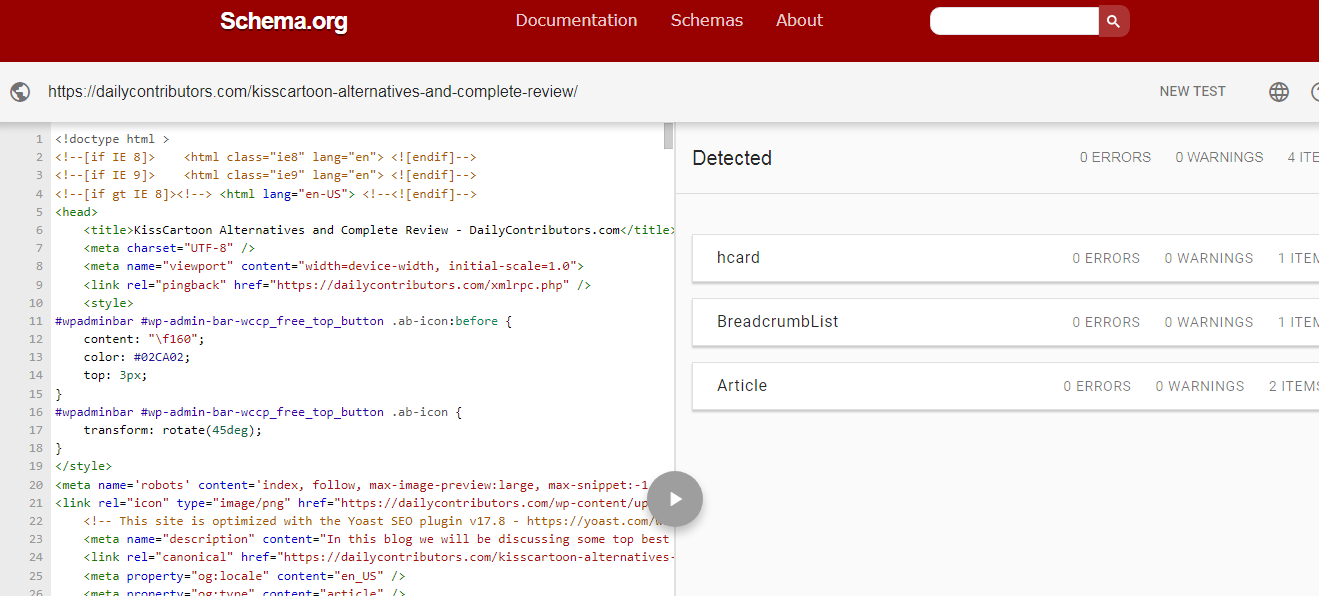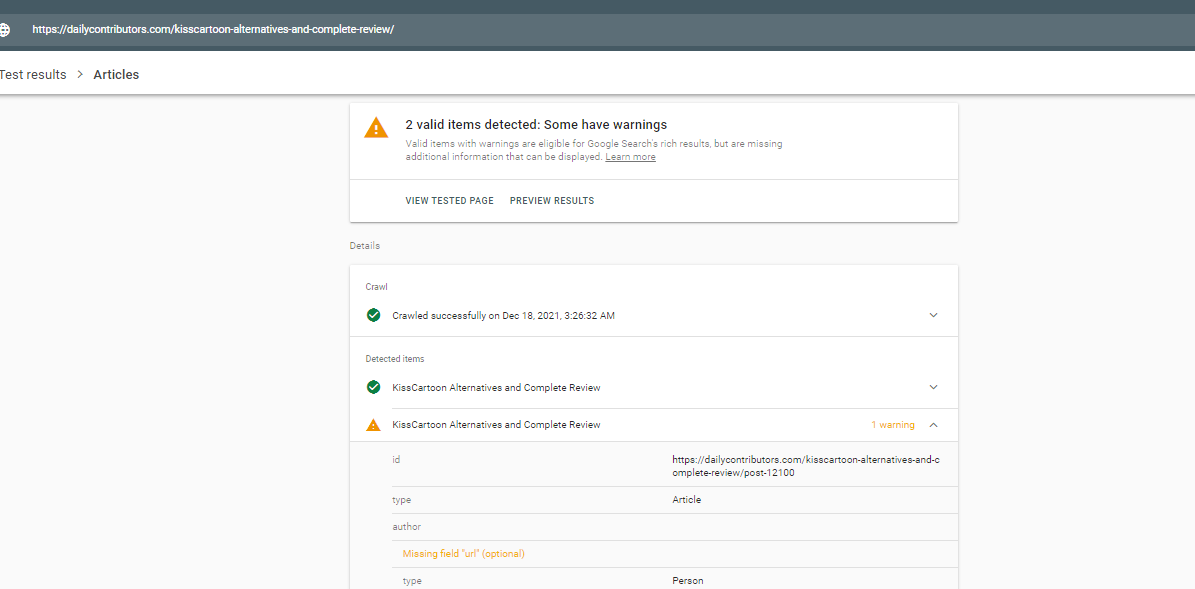Moz Q&A is closed.
After more than 13 years, and tens of thousands of questions, Moz Q&A closed on 12th December 2024. Whilst we’re not completely removing the content - many posts will still be possible to view - we have locked both new posts and new replies. More details here.
Schema Markup Warning "Missing field "url" (optional)"
-
Hello Moz Team, I hope everyone is doing well & good,
I need bit help regarding Schema Markup, I am facing issue in my schema markup specifically with my blog posts,
In my majority of the posts I find error "Missing field "url" (optional)"
As this schema is generated by Yoast plugin, I haven't applied any custom steps.Recently I published a post
https://dailycontributors.com/kisscartoon-alternatives-and-complete-review/
and I tested it at two platforms of schema test
1, Validator.Schema.org
2. Search.google.com/test/rich-resultsSo the validator generate results as follows and shows no error

It shows no error
But where as

in search central results it gives me a warning "Missing field "url" (optional)".
So is this really be going to issue for my ranking ? Please help thanks!
-
@JoeySolicitor I thinks , My website sam with your issue
Got a burning SEO question?
Subscribe to Moz Pro to gain full access to Q&A, answer questions, and ask your own.
Browse Questions
Explore more categories
-
Moz Tools
Chat with the community about the Moz tools.
-
SEO Tactics
Discuss the SEO process with fellow marketers
-
Community
Discuss industry events, jobs, and news!
-
Digital Marketing
Chat about tactics outside of SEO
-
Research & Trends
Dive into research and trends in the search industry.
-
Support
Connect on product support and feature requests.
Related Questions
-
What Schema would a Web design/development/seo ageny use and what is the schema.org link?
What Schema would a Web design/development/SEO Ageny use, and what is the schema.org link? I cannot for the life of me figure it out. ProfessionalService has been deprecated.
On-Page Optimization | | TiagoPedreira0 -
Unsolved Duplicate LocalBusiness Schema Markup
Hello! I've been having a hard time finding an answer to this specific question so I figured I'd drop it here. I always add custom LocalBusiness markup to clients' homepages, but sometimes the client's website provider will include their own automated LocalBusiness markup. The codes I create often include more information. Assuming the website provider is unwilling to remove their markup, is it a bad idea to include my code as well? It seems like it could potentially be read as spammy by Google. Do the pros of having more detailed markup outweigh that potential negative impact?
Local Website Optimization | | GoogleAlgoServant0 -
What do we know about the "Shops" SERP Feature?
I came across this SERP Feature in a search today on a mobile device. It does not show for the same search query on desktop. What do we know about this "Shops" SERP feature? shops-blur.jpg
SERP Trends | | seoelevated0 -
Looking for live web examples of Medical schema
Has anyone seen a hospital system or medical clinic properly employ schema markup to their sites? This seems like very new territory, and we want to do it right by our client. Are there any best practices I need to look out for?
Web Design | | Madgenius3 -
"5XX (Server Error)" - How can I fix this?
Hey Mozers! Moz Crawl tells me I am having an issue with my Wordpress category - it is returning a 5XX error and i'm not sure why? Can anyone help me determine the issue? Crawl Issues and Notices for: http://www.refusedcarfinance.com/news/category/news We found 1 crawler issue(s) for this page. High Priority Issues 1 5XX (Server Error) 5XX errors (e.g., a 503 Service Unavailable error) are shown when a valid request was made by the client, but the server failed to complete the request. This can indicate a problem with the server, and should be investigated and fixed.
Technical SEO | | RocketStats0 -
Schema Markup Errors - Priority or Not?
Greetings All... I've been digging through the search console on a few of my sites and I've been noticing quite a few structured data errors. Most of the errors are related to: hcard, hentry and hatom. Most of them are missing author & entry-title, while the other one is missing: fn. I recently saw an article on SEL about Google's focus on spammy mark-up. The sites I use are built and managed by vendors, so I would have to impress upon them the impact of these errors and have them prioritize, then fix them. My question is whether or not this should be prioritized? Should I have them correct these errors sooner than later or can I take a phased approach? I haven't noticed any loss in traffic or anything like that, I'm more focused on what negative impact a "phased approach" could have. Any thoughts?
Technical SEO | | AfroSEO0 -
Wordpress "incoming search terms" plugin
Hello everyone! newbie to SEO and have been trying to keep everything nice and ethical but I've seen on a couple of blogs today "incoming search terms" at the bottom of the blogs, then a bullet pointed list of search terms beneath it. So I had a quick search about the use of it and noticed wordpress has a plugin that automatic ally generates these "incoming search terms". I ask is this a legitimate plugin or will this harm my blog? I assume it generally will as I can't see this being much use for the audience, rather it would be 100% for trying to lure in search engines.
Technical SEO | | acecream0 -
How to block "print" pages from indexing
I have a fairly large FAQ section and every article has a "print" button. Unfortunately, this is creating a page for every article which is muddying up the index - especially on my own site using Google Custom Search. Can you recommend a way to block this from happening? Example Article: http://www.knottyboy.com/lore/idx.php/11/183/Maintenance-of-Mature-Locks-6-months-/article/How-do-I-get-sand-out-of-my-dreads.html Example "Print" page: http://www.knottyboy.com/lore/article.php?id=052&action=print
Technical SEO | | dreadmichael0